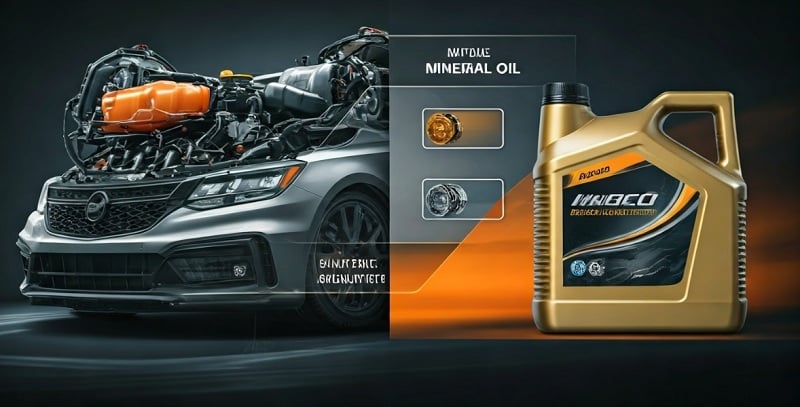
Key Highlights
- Engine oil is crucial for lubrication and reducing friction between engine parts, directly impacting performance and longevity.
- Mineral oil is derived from refined crude oil, making it a more affordable but less refined option.
- Synthetic oil is engineered in a lab, offering superior performance, consistent viscosity, and greater resistance to thermal breakdown.
- Choosing the right type of oil depends on your vehicle model, driving conditions, and budget considerations.
- Always refer to your owner’s manual for manufacturer recommendations on oil types and change intervals.
Introduction
Engine oil is very important for your vehicle. It helps everything run smoothly and keeps the engine working longer. There are different kinds of oil, and it can be tough to pick between synthetic oil and mineral oil. This guide will explain the differences between these two types of engine oil. It will help you choose the right one for your vehicle.
Understanding the Basics of Engine Oils
Engine oils are made up of base oils and additives. The base oil is the main part of the oil. It decides the oil’s basic traits. Additives are added to improve certain features like thickness, wear resistance, and protection against rust. This mix helps the engine oil to lubricate, clean, cool, and safeguard the engine parts.
Choosing between mineral oil and synthetic oil is about the kind and quality of these base oils. Knowing their differences is important for picking the right oil for your vehicle and how you drive.
You can also read: Is Synthetic OIl is better for Diesel Engines?
The Role and Importance of Engine Oil in Your Vehicle
The main job of engine oil is lubrication. It creates a thin layer between moving engine parts. This helps reduce friction and wear. Good lubrication is important. It minimizes heat, stops parts from failing too soon, and keeps the engine running well.
Engine oil also cleans the engine. It picks up dirt, debris, and waste from burning fuel. This cleaning keeps harmful buildup from happening. A clean engine works better and more efficiently.
Also, engine oil helps manage the engine’s temperature. It absorbs heat made during combustion and moves it to the oil pan. This cooling is key to keeping the engine at the right temperature and stopping it from overheating. Choosing the right engine oil is very important. It affects your vehicle’s performance, efficiency, and longevity.
Key Differences in Composition Between Synthetic and Mineral Oils
Both mineral and synthetic oils have their roots in crude oil, but their refining and processing methods differ significantly, resulting in distinct chemical compositions and performance characteristics. Understanding these differences is critical in selecting the optimal oil for your engine.
Mineral oils are derived directly from crude oil through a refining process that removes impurities but retains a wider range of hydrocarbon molecules. These typically include:
| Base Oil Type | Characteristics |
| Paraffinic Oil | Offers good stability and viscosity index but can solidify at low temperatures. |
| Naphthenic Oil | Exhibits good low-temperature fluidity but has lower stability. |
| Aromatic Oil | Possesses good solvency but has the lowest stability. |
Synthetic oils, on the other hand, are engineered in a lab. They undergo a more complex refining process, resulting in a more uniform molecular structure and superior performance characteristics compared to mineral oils. Synthetic oils often primarily utilize paraffinic oil and olefinic oils for their enhanced stability and performance properties.
You can also read: How many month does synthetic oil last?
Conclusion
In conclusion, it is important to know the differences between synthetic and mineral oils. Synthetic oils protect better and last longer. On the other hand, mineral oils are cheaper and good for everyday use. Choosing the right oil based on your vehicle’s needs and your driving habits can really help your engine run better and last longer. You should think about talking to a professional mechanic. They can help you find the best oil for your vehicle to keep it running smoothly.
Schedule a maintenance check for your vehicle’s engine oil today. This way, you can decide if switching to synthetic oil is a good move for better performance.
Frequently Asked Questions
What Makes Synthetic Oil Different from Mineral Oil?
The main difference is in the refining process. Both synthetic oil and regular oil come from crude oil. However, synthetic oil goes through a tougher refining process. This helps to remove more impurities. It also uses special base oils and additives to give it better performance.
Can I Switch From Mineral to Synthetic Oil in My Vehicle?
It’s usually safe to switch oils, but it’s best to check your owner’s manual first. Some engine types may require the use of fully synthetic oils. Also, switching might not give the same benefits for older engines that are used to mineral oil. They might have fewer performance enhancements.
How Often Should I Change Synthetic Oil Compared to Mineral Oil?
Synthetic oil usually lasts longer than mineral oil, so you won’t need to change it as often. Mineral oil often requires changes every 3,000 miles, while synthetic oil can last for 7,500 miles or even more. This can depend on your car and how you drive. Always follow your car manufacturer’s advice to get the best mileage and sustainability.
Are There Any Engine Types That Perform Better With Synthetic Oil?
High-performance engines, turbocharged engines, and engines that deal with very hot or very cold temperatures can gain a lot from using synthetic motor oil. This type of oil is better at toughing out thermal breakdown and keeping its viscosity. Because of this, synthetic motor oil provides better protection for important engine parts in these hard situations compared to conventional motor oil.
Recent Posts
Advanced Tire Balancing Beads for Smooth Ride: Optimize Vehicle Performance
Smooth rides are essential for any vehicle, and tire balancing beads play a crucial role in achieving this. These tiny, yet powerful, beads ensure optimal tire performance for trucks, off-road...
Professional Paint Scratch Repair Kit for Cars: Revitalize Vehicle Aesthetics
Scratches and blemishes on your car can diminish its appearance. A professional paint scratch repair kit can help restore it. These kits are designed to...
